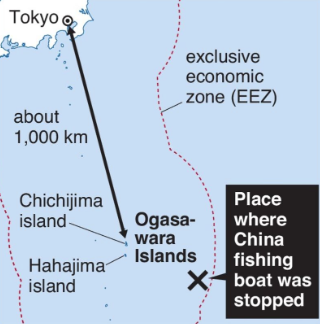TOKYO — Coral poaching by Chinese ships is feared to be resuming again in Japan’s exclusive economic zone near the Ogasawara Islands in Tokyo, following the arrest of the captain of a Chinese fishing boat by the Japan Coast Guard for refusing a halt order in waters near the islets.
The JCG arrested ship captain Chen Wen Ting, 40, on Saturday on suspicion of violating the Exercise of the Sovereign Right for Fishery Law, which deals with refusing to allow a boarding inspection.
The waters around the islands are home to rare “jewelry coral.” Five years ago, the poaching of such coral by Chinese fishing boats in waters near the Ogasawaras emerged as a problem.
The JCG suspects the fishing boat in this case entered the waters for the purpose of poaching.
Although the problem had previously been brought under control following a crackdown on Chinese poachers, the JCG fears a recurrence and has stepped up its vigilance and surveillance activities.
According to the Yokohama Coast Guard Office, a JCG patrol boat on Saturday morning ordered the Chinese ship to stop as it was navigating Japan’s EEZ about 298 kilometers east of Hahajima island in the Ogasawaras. The boat, with 11 Chinese fishermen including Chen aboard, suspected of attempting to flee for about two hours.
The waters off Chichijima island of the islets are known for their abundance of coral.
Judging from the Chinese boat’s equipment and external appearance, the JCG believes that it entered the EEZ for poaching. JCG officials have been inspecting the ship and questioning the crew.
From September 2014, a large number of Chinese ships for poaching coral started trespassing into Japan’s territorial waters and the EEZ. At its peak, a convoy of more than 200 ships were confirmed in a single day.
To address the situation, the JCG tightened controls over such Chinese fishing boats, and busted 10 Chinese fishing boats in the period from October to December 2014.
Japan also asked China to take steps to prevent a repeat of the poaching, while stiffening penalties for unlicensed operations by foreigners in its territorial waters and the EEZ. The maximum fines for violations were increased by three to eight times, to as high as ¥30 million.
Such measures proved successful, and no Chinese ships appeared in the EEZ around the islands after January 2015. However, that situation has changed recently, as several Chinese fishing boats have been confirmed again in the EEZ.
On separate occasions, the JCG caught four Chinese fishing boats from Jan. 28 to 31 which it suspected of poaching in the EEZ off Okinawa Prefecture. The vessels allegedly ignored orders to halt and tried to flee.
Given this situation, it is believed that Chinese boats have become actively poaching in waters around the Ogasawaras and other areas.
As measures to prevent a resumption of poaching by Chinese ships, the JCG plans to add more officers to the Ogasawara Coast Guard Station, which guards the area, and deploy a patrol boat to Chichijima island.
“We will tighten control before [Chinese ships] swarm in, in a way to avoid generating concern among local people,” a JCG senior official said.
Jewelry coral
The species that includes red, pink and white corals, considered precious as gemstones, that are found on the seabed 100 meters or deeper. In China, red coral is especially popular and trades at a high price. Because of a slow growth rate, the corals are said to take 50 years to grow to the size of an adult little finger.
